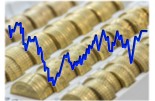Han Dieperink: European equities are justifiably cheap

This column was originally written in Dutch. This is an English translation.
By Han Dieperink, written in a personal capacity
Despite the price increase of European equities this year, the discount of European equities to US equities has risen to 40%. This while a discount of about 20% has been common for the past twenty years. How can this be explained?
The main explanation for such a discount is the sector distribution. Compared to the United States, relatively few technology companies are active in Europe and these are currently highly valued. The American technology sector is ten times the size of the European one. But even corrected for this sector breakdown, it is indeed the case that every European sector has a lower valuation than its American counterpart.
For many investors, such a discount is a reason to consider European equities. Nevertheless, it is wise to first take a look at the factors behind this discount. As so often, it is a complex of factors:
1) Europe was hit harder than the US in the Great Financial Crisis. The European financial sector was much larger than that of the US and the main US export at the beginning of this century was bad mortgage loans. This even caused a euro crisis in 2012.
2) The euro itself is still a diverging system. The differences between North and South are getting bigger, not smaller. Rising debt as a percentage of GDP in various countries in combination with rising interest rates threatens a new euro crisis in the long term.
3) A war on the European continent is not exactly value-enhancing. This war has also ensured that energy is nowhere in the world as expensive as in Europe. Europe's competitive position has deteriorated as a result. Moreover, Russians and, in its wake, Chinese and Arabs will be reluctant to invest in Europe from now on.
4) The energy transition will cost around 5 trillion euros by 2030. Of this, approximately EUR 1.6 trillion comes from the EU. The rest must come from national governments and the private sector. That 3.4 trillion is equivalent to 2.7% of the GDP of the Eurozone. Such investments depress growth in the short term, even if they make a positive contribution in the long term.
5) The UK is an important part of Europe and UK stocks are discounted to European stocks. Partly due to Brexit, but also due to inflation dynamics and the impact on UK government finances.
6) The European stock market is much smaller than the US. Moreover, it also consists of numerous smaller national markets, at the expense of liquidity. Europeans also invest more money in houses than in stocks, compared to the US. Institutional investors in Europe also invest less in equities than their American counterparts. The lack of a European equity culture and lower liquidity translates into a lower valuation.
7) The US stock market has benefited more from the low interest rate than the European one, partly because of the higher percentage of growth stocks. That could change now that interest rates in the US have risen more than in Europe. However, inflation in Europe appears to be more stubborn than in the US, partly due to the flexibility of the US economy. While the US can suffice with a soft landing, a recession may be required in Europe.
8) American companies pay less tax than European ones. The extra levies imposed on integrated oil companies because of the sharp rise in energy prices are also depressing valuations in Europe. Moreover, the tax-legal basis for such levies is wafer-thin. But it may become more common in the future, including at other companies. This is unthinkable in the US.
9) The European economy is much more open than the US. This also means that the boycott of Russia has more impact in Europe than in the US. Europe is also much more sensitive to developments in China. This could also be an argument for Europe, if investors flock to China en masse, but that does not seem to be the case at the moment.
10) US companies have higher profit margins and much better returns than European companies. Of course there is always a discussion about whether these high profit margins are sustainable in the future, but highly profitable companies are simply valued higher.
This summary does not mean that European investments have no chance at all. The advantage of such a discount is that more M&A activity may be expected in Europe, given the valuation gap between US companies and their European counterparts. Furthermore, it also applies to US equities that returns from the past are not indicative of the future. At the same time, valuation is an important determinant of long-term returns, but short-term valuation (which can easily last for several years) has remarkably little impact on returns.






